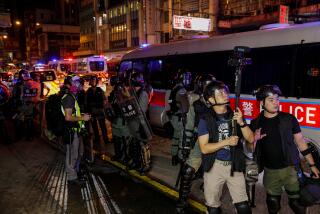Jury deadlocks on 2 in British bomb plot trial
- Share via
LONDON — After a six-month trial, jurors were dismissed Tuesday after failing to reach a verdict on the fates of two remaining defendants charged with attempting to blow up portions of London’s public transit system in 2005.
On Monday, four plotters were found guilty of conspiracy to commit murder. They are to be sentenced today. Their lawyers had contended the bombs, which failed to explode, were meant to scare the public rather than cause physical damage.
The jurors were unable to reach a decision about Manfo Asiedu, 33, and Adel Yahya, 24, after nine days of deliberations. Both men pleaded not guilty to charges that they also intended to kill hundreds of London commuters on July 21, 2005. They may face retrial.
British prosecutors presented closed-circuit video of Asiedu and self-confessed ringleader Muktar Said Ibrahim, 29, buying massive amounts of hydrogen peroxide that authorities said was used to build the explosives.
Asiedu, who admitted to knowing the bombs were not a hoax, said Ibrahim bullied him into participating in the plot. The defense also argued that on the day of the failed attacks, Asiedu changed his mind at the last minute and left his bomb intact in a North London park.
Yahya, an immigrant who was visiting his native Ethiopia at the time of the botched attacks, denied any knowledge of the plot.
Authorities praised the convictions of Ibrahim; Ramzi Mohammed, 25; Yassin Omar, 26; and Hussain Osman, 28. However, some opponents of the government accused police and security forces of systematic failings over the attempted suicide bombings.
“When will the government answer our call to establish a dedicated U.K. border police force to secure our porous borders?” asked David Davis, the Conservative Party’s shadow Home secretary.
During the trial, prosecutors revealed that Ibrahim, who previously had been charged with robbery and sexual assault, was allowed to leave the country despite being under police surveillance. After questioning at Heathrow Airport, the Eritrean-born Ibrahim flew to Pakistan, where he was said to have trained for three months and learned to build bombs similar to those used in the deadly London transit bombings on July 7, 2005.
Home Secretary Jacqui Smith said Britain had increased the number of immigration officers and was using new technology such as biometric visas and electronic screening. “The law is also being tightened to ensure that foreign national prisoners face automatic consideration of deportation if they have committed a serious offense,” she added.
Meanwhile, in Scotland, another alleged would-be bomber remains in critical condition, said a spokeswoman at the Glasgow Royal Infirmary.
Authorities said Kafeel Ahmed, 27, suffered third-degree burns after ramming a Jeep Cherokee into Glasgow Airport on June 30, a day after police in London found two unexploded car bombs.
Ahmed, an aeronautical engineer from India, worked for Infotech Enterprises, an outsourcing firm with ties to Boeing and Airbus, according to the Associated Press.
--
More to Read
Sign up for Essential California
The most important California stories and recommendations in your inbox every morning.
You may occasionally receive promotional content from the Los Angeles Times.













